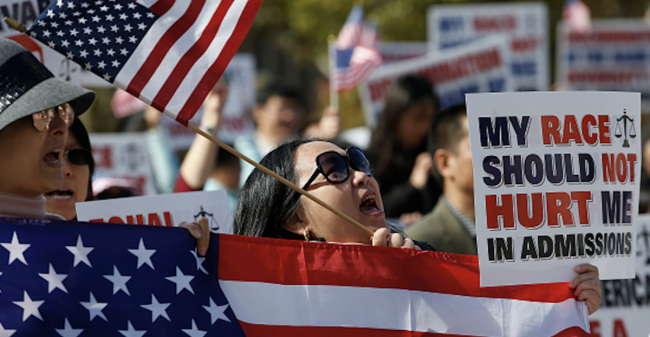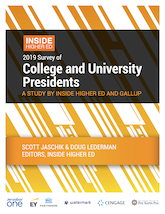You have /5 articles left.
Sign up for a free account or log in.

Protest outside closing arguments in Harvard case
Getty Images
Strong majorities of college presidents -- from public and private institutions alike -- believe that colleges should continue to consider race and ethnicity, among other factors, in admissions decisions. But the support is not as strong as it was in 2013, when Inside Higher Ed and Gallup last asked presidents about the issue.
At that time, it was as the U.S. Supreme Court was preparing to take up the issue. This time the survey took place as many in academe are anxiously awaiting a ruling on a lawsuit charging that Harvard University's affirmative action policies discriminate against Asian American applicants. (A ruling is expected by June.)
 This year's survey points to some doubts about whether Harvard will prevail. Further, the survey found many presidents fear that Asian American applicants may face discrimination in the admissions process. And this year's survey finds private college leaders remain supportive of giving admissions preferences to children of alumni, a practice at Harvard (and many other institutions) that received critical attention during the trial.
This year's survey points to some doubts about whether Harvard will prevail. Further, the survey found many presidents fear that Asian American applicants may face discrimination in the admissions process. And this year's survey finds private college leaders remain supportive of giving admissions preferences to children of alumni, a practice at Harvard (and many other institutions) that received critical attention during the trial.
A full report on the survey of 784 presidents (which covered many other issues as well as admissions) may be found here.
Sixty-two percent of college presidents either strongly agreed or agreed that colleges should continue to consider race and ethnicity in admissions. Support was slightly stronger in public than in private higher education (67 versus 60 percent). Across all sectors, 19 percent disagreed or strongly disagreed.
Inside Higher Ed asked the question differently in 2013, but the years since then seem to have slightly reduced support for consideration of race in admissions. That year, a full 70 percent of presidents surveyed agreed or strongly agreed with the statement that the consideration of race in admissions has had a "mostly positive effect on higher education generally." Only 11 percent disagreed or strongly disagreed.
Back to this year's survey, the support for consideration of race in admissions does not translate into great confidence that Harvard will win the legal battle. Only 37 percent of college presidents agreed or strongly agreed that they were confident in Harvard's defense. Twenty-seven percent of presidents disagreed or strongly disagreed.
The issue of affirmative action is playing out in the court of public opinion in addition to the federal court hearing the Harvard case. In the legal case and in public discussion, Harvard (like many colleges with similar approaches) has stressed that it practices holistic admissions, in which there is no single rubric or cutoff score considered, but applicants are evaluated on all of the facets of their background and qualifications.
More than three-fourths of presidents (79 percent) agreed or strongly agreed that the public does not understand the concept of holistic admissions.
Despite their mixed views on whether Harvard will prevail legally, most colleges are not making plans for the possibility that they may need to approach admissions in different ways. Only 16 percent of presidents at public institutions, and 11 percent of those at private institutions, said that their colleges are planning for the possibility that courts may limit or bar the consideration of race in admissions or financial aid.
A lack of preparation could be costly. When voters in California and Michigan voted to bar their states' public colleges from considering race and ethnicity in admissions, the public colleges saw sharp drops in minority enrollments, especially of African Americans.
While college leaders back Harvard, many believe that some discrimination may exist against Asian Americans -- something that you don't hear them saying in public.
Asked about the statement "I worry some Asian American applicants to top colleges face discrimination," 42 percent agreed or strongly agreed. Only 24 percent disagreed or strongly disagreed.
Edward Blum, who is coordinating the legal campaign against Harvard, noted in an interview that a recent survey of the public by the Pew Research Center found that nearly three-fourths (73 percent) of a representative sample of Americans said that race or ethnicity should not be a factor in college admissions.
"It is disappointing, but no longer surprising, to see that the leadership of higher education is so badly out of step with the vast majority of their fellow Americans," Blum said.
Richard Anthony Baker, assistant vice chancellor and vice president for equal opportunity services for the University of Houston System and president of the American Association for Access, Equity and Diversity, said via email that he was heartened by the presidents' support for affirmative action.
"What college presidents understand is that we are not yet in a postracial America and that programs that support equal opportunity are still needed today," Baker said. "Despite the tremendous progress we have made in this country in eliminating barriers to higher education for many, college presidents know that these barriers still exist and that the merit for admissions cannot simply be assessed by test scores alone. The holistic approach is appropriate and has been deemed legal over and over again for almost 50 years."
Legacy Preferences
When Inside Higher Ed surveyed college admissions directors last year, 42 percent of admissions leaders at private colleges and universities said that legacy status is a factor in admissions decisions at their institutions. The figure at public institutions is only 6 percent. (In some cases, the preference at public institutions is to grant alumni children in-state status even if they are from out of state, and that can make a significant difference in a candidate's odds of admission.)
In the survey of presidents, support was stronger for consideration of legacy status at private than at public institutions, and support is stronger from private college presidents than their public counterparts. More than half of presidents (52 percent) said it was appropriate for private colleges to consider legacy status. (The percentage was higher, 60 percent, among private college leaders.)
Only 24 percent of presidents said that it was appropriate to do so at public colleges. Here, too, the percentage was higher at private colleges (29 percent to 19 percent).
Many higher education leaders have speculated that limits on the ability of colleges to consider race and ethnicity might lead to reconsideration of legacy preferences, which tend to primarily benefit white applicants. Eighteen percent of presidents said that new legal limits on affirmative action would prompt them to reconsider their views on legacy preferences.




